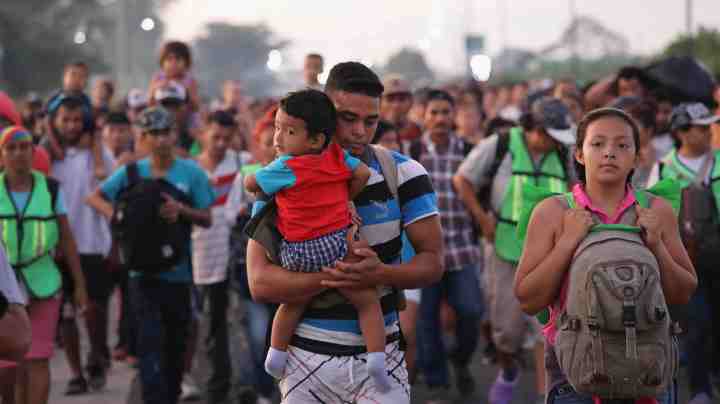This Spike-Lee Directed Video From The Killers Is a Direct Response to Trump’s Border Wall

Members of a immigrant caravan walk into the interior of Mexico after crossing the Guatemalan border on October 21, 2018 near Ciudad Hidalgo, Mexico. Photo by John Moore/Getty Images
Citing the ludicrous border wall at the center of the capricious government shutdown currently affecting the country, the newly released song “Land of the Free”by Las Vegas band The Killers is an opportune response to the administration’s inhumane stance against immigrants and people of color in general.
To match the resonant verses penned by lead singer Brandon Flowers with equally potent images, the band procured the visionary eye of revered filmmaker Spike Lee, whose 2018 feature BlacKkKlansman is picking up steam this awards season. In describing his latest joint to The Hollywood Reporter, Lee insisted the resulting piece from the collaboration is not a music video, but a short film.
The iconic director shot the footage seen in the “Land of the Free” late last year along the US-Mexico border as the immigrant caravan reached Tijuana. The short documentary, set to the tune of choir singers, is a carefully assembled portrait of suffering, tenacity, and compassion.
In Lee’s frames people from Honduras, El Salvador, and other Central American countries who are escaping poverty and violence are portrayed not as an invasive threat, but rather as human beings deserving of dignity, safety, and happiness. Amid precarious living conditions in makeshift camps, refugees are filmed with a thoughtful gaze.
A man by the beach on the Mexican side of the border is shown flying a kite into the open sky. Manmade barriers do not restrict his colorful artifact, thus it flies freely above the fence that divides these two lands. Later, a group of children hit a piñata and delight in the multitudes of candy that rains down on them. Parents nurturing their kids, people marching as one unified front, and strident clashes between authorities and those on a quest for survival complete Lee’s take on the humanitarian crisis.
What we hear as the perceptive scenes unfold are lyrics discussing police brutally perpetrated against vulnerable groups, the imperative need for gun control, and, pointedly, the anti-immigrant sentiment festering in certain circles of American society. Near the end, Flowers refers to the Central American refugees seeking asylum as “people who just want the same things we do, in the land of the free.” It’s a simple statement that succinctly encapsulates what’s at the core of their struggle.